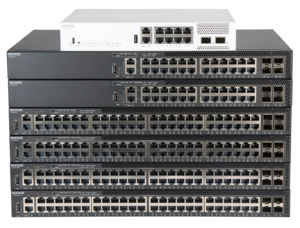Bem-vindo à RUCKUS Networks, parte do portfólio líder mundial de soluções de rede da CommScope. Saiba mais.
Wi-Fi® should just work, right? But what happens when your Wi-Fi connection starts to falter, leaving you frustrated and disconnected? That's where Wi-Fi network resiliency comes in. Let's explore the importance of WLAN resiliency and how it can ensure a stable and consistent connection. We'll dive into the role of wired infrastructure in supporting Wi-Fi resiliency, as well as the specific ways a Wi-Fi network itself can boost its own resilience. Additionally, check out the essential tips to enhance Wi-Fi network stability and strength, including the benefits of a robust wired infrastructure and innovative features built into RUCKUS® access points.
The Importance of Wi-Fi Resiliency
Resilient Wi-Fi is crucial for ensuring uninterrupted connectivity for users. By implementing redundancy and backup systems, organizations can minimize downtime and maintain consistent connections. Regular monitoring and maintenance help prevent potential issues and ensure optimal performance. Implementing security measures protect against cyber threats and safeguard sensitive data. Investing in reliable equipment and infrastructure, such as high-quality access points and reliable switches, enhances the overall network resilience. Additionally, creating a scalable network design allows for future flexibility, accommodating the increasing demand for internet access IoT devices. By prioritizing Wi-Fi network resilience, businesses can effectively address the challenges and maintain a high quality of service.
How Does a Wired Infrastructure Support Wi-Fi Resiliency?
Wired network infrastructure plays a crucial role in supporting Wi-Fi resiliency. It provides a stable and reliable backbone, enabling faster data transfer speeds and reducing latency. Additionally, wired connections can handle heavy network traffic, providing a consistent and uninterrupted Wi-Fi experience even during interference or outages.
How does a Wi-Fi Network Drive Resiliency?
A Wi-Fi network drives resiliency by utilizing multiple access points to provide a strong and reliable signal. Redundancy measures, such as dual-band routers or mesh network systems, allow the network to continue functioning even if one access point fails. RUCKUS's patented technology goes one step further, allowing access points to pass network traffic even when connection to the controller is unavailable! Advanced security features, like WPA3 encryption, authentication and authorization applications, or firewalls and SDN, enhance resilience against cyber threats while regular maintenance and updates improve overall network resiliency.
Essential Tips for Boosting Wi-Fi Network Resiliency
To enhance the resiliency of your Wi-Fi network, it is crucial to invest in high-quality Wi-Fi equipment and ensure it is properly configured. This includes setting up multiple access points and switches to create network redundancy. Regularly updating firmware and security patches protects against vulnerabilities and strengthens the network's defenses.
Optimizing your Wi-Fi network's performance involves minimizing interference from other devices and networks, thereby maximizing throughput and bandwidth. Monitoring and analyzing network performance allows you to identify and address any issues or bottlenecks promptly. Leveraging network analytics tools like RUCKUS One™ or RUCKUS AI™ can help you gain insights into your network's performance and address any problems that arise.
By implementing these essential tips, you can boost the resiliency of your Wi-Fi network, getting uninterrupted internet access and a seamless experience for all connected devices.
Can a Robust Wired Network Infrastructure Enhance Wi-Fi Resiliency?
A robust wired network infrastructure plays a crucial role in enhancing Wi-Fi strength and stability, providing a stable backbone and ensuring better performance and reliability. Today's access points require higher bandwidth capabilities per port. Ensuring that your wired backbone has the correct capacity and is configured to handle the volume of device connectivity is critical to strong Wi-Fi.
The Importance of RUCKUS ICX® Switches and VSRP
RUCKUS ICX switches offer reliable connectivity and advanced network resiliency, helping to provide seamless internet access and uninterrupted performance. For example, with RUCKUS's Virtual Switch Redundancy Protocol (VSRP), failover is seamless, maximizing uptime and minimizing network downtime.
These switches incorporate numerous security features for authentication and authorization, safeguarding against cyber threats and unauthorized access. Scalable in nature, RUCKUS ICX switches and VSRP are suitable for networks of all sizes. By utilizing these solutions, businesses can enhance their Wi-Fi network resiliency, providing a stable and secure wireless network for their operations.
RUCKUS Access Points Allow Network Traffic Even if Control and Management is Unavailable
RUCKUS access points provide uninterrupted network traffic, even in situations where control and management systems face downtime. The resilience of a company's Wi-Fi network is vital for maintaining productivity and ensuring uninterrupted internet access. RUCKUS access points prioritize the user experience by offering seamless network traffic flow, minimizing disruptions caused by failures in control and management systems. This capability is crucial for avoiding costly downtime and maintaining customer satisfaction. With RUCKUS access points, businesses can reap the benefits of a reliable wireless network that continues to function even if control and management systems are unavailable.
Real-world Implications of Wi-Fi Network Resiliency on Business, Internet, and IoT
Today's digital world requires a resilient Wi-Fi network. By implementing methods such as mesh networks, redundant connections, faster failover, and uninterrupted network traffic flow, the resiliency of your Wi-Fi network can be improved. The consequences of network downtime be significant, so emphasizing the need for a reliable network is critical. To ensure resiliency, it is crucial to follow best practices in maintaining and troubleshooting Wi-Fi networks. With the increasing reliance on internet access, IoT devices, and the demand for high throughput and quality of service, a robust Wi-Fi network plays a critical role in various domains including education, digital stewardship, multi-dwelling units, and bridging the digital divide. Collaborators such as internet service providers, cellular networks, and digital stewards in cities across the world aim to address the challenges and improve Wi-Fi resiliency. These efforts are supported by wired network infrastructure and robust management, analytics, switches, and access points.
Conclusion
In conclusion, having a resilient Wi-Fi network is crucial for success. Whether it's for business operations or personal use, a strong and reliable Wi-Fi connection is essential. By combining a robust wired network infrastructure with the right equipment and technologies, you can enhance the resiliency of your Wi-Fi network. RUCKUS ICX switches, access points, and analytics are excellent options that allow for uninterrupted network traffic even if control and management are unavailable. Investing in these solutions can greatly improve the reliability and performance of your Wi-Fi network. Don't let connectivity issues slow you down. Boost your Wi-Fi network resiliency with these essential tips and ensure a seamless online experience.
















